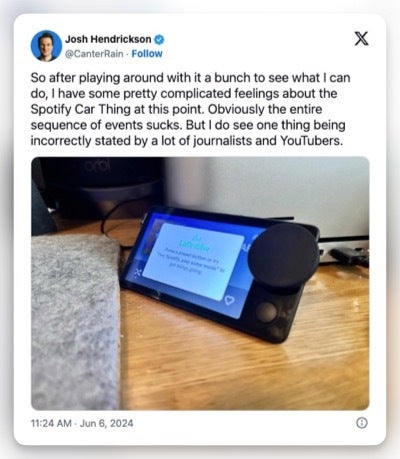Image credit: Spotify
The recent news of Spotify's plan to shut down all Car Thing devices by the end of the year has caused quite a stir. The streaming giant discontinued sales of the device a while back, but the announcement to completely deactivate functional units has drawn criticism from users who were hoping for a more sustainable solution.
A tech enthusiast, Josh Hendrickson, recently shed light on an interesting detail about the Car Thing that Spotify hadn't publicized. It turns out that the device is, in fact, open source. Hendrickson shared his findings on Twitter, revealing that the Car Thing runs on Linux and the source code for its U-boot and Linux kernel is readily available on GitHub. Additionally, the Amlogic chip used in the device allows users to run custom code and even add their own software.
So, why didn't Spotify make this information public? Hendrickson believes it's due to the Car Thing's hardware limitations. With a weak Amlogic processor, limited storage, and minimal RAM, the device struggles to run anything beyond its intended purpose as a lightweight web-based music player. Although the Car Thing is technically open for modifications, its underwhelming performance makes any significant repurposing rather pointless.
This new information adds another layer of disappointment to the Car Thing saga. Hendrickson even refers to the device as "open-source e-waste." For those interested in the technical details, he plans to release a comprehensive video delving deeper into the inner workings of the Car Thing.
Looking back, it seems questionable for Spotify to have invested in creating a $100 device solely for playing music from the web. There were arguably more efficient and environmentally friendly alternatives available, such as improving integration with existing car infotainment systems or leveraging the capabilities of smartphones.
While the open-source nature of the Car Thing might have offered a glimmer of hope for repurposing, its hardware limitations ultimately render it impractical for anything beyond its original function. As Spotify moves forward, it's hoped that the company will consider more sustainable and practical solutions for its future hardware endeavors.
Read the latest from Johanna Romero












Things that are NOT allowed: